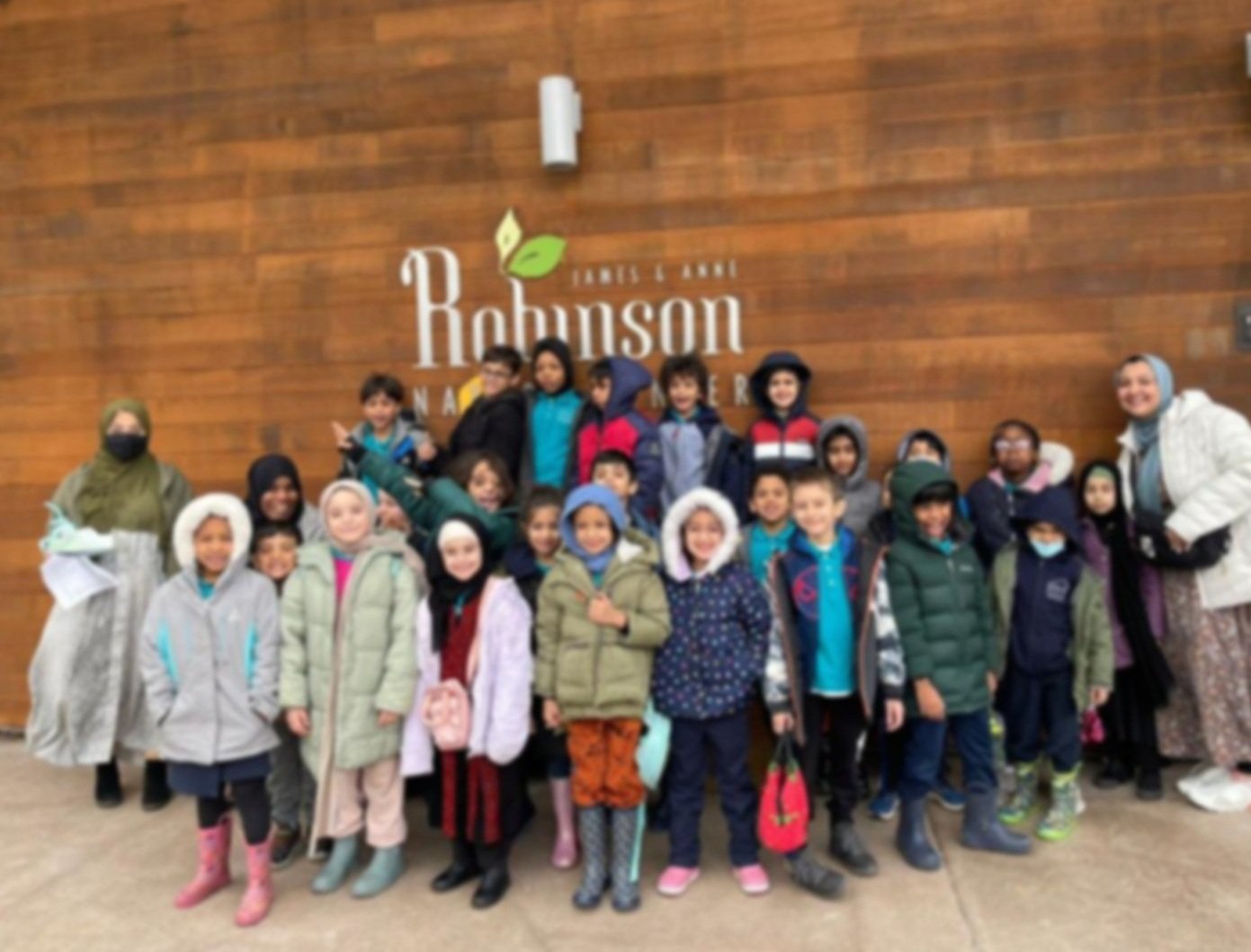
Elementary community
Lower Elementary (Ages 6-9) & Upper Elementary (Ages 9-12)
Elementary Program Overview:
The Montessori Elementary program at Aya Montessori, designed for children ages 6 to 12, meets the developmental needs of this age group by fostering curiosity, critical thinking, and a lifelong love of learning. Building on the Primary years, the curriculum expands children’s exploration to the universe itself, helping them understand how the world functions and how they impact it. With a focus on transitioning from concrete to abstract thinking, children are encouraged to ask “why” and “how,” using imagination and reasoning to delve into concepts beyond their immediate experience.
The program offers an integrated curriculum in mathematics, geometry, geography, science, history, art, music, and English. Lessons are introduced as engaging “keys” that inspire exploration and discovery, with hands-on materials and opportunities for independent or collaborative research. This approach allows students to connect various disciplines, fostering an understanding of the relationships between physical, biological, and cultural phenomena. Instead of rote memorization, children apply critical reading, writing, and analytical skills to meaningful projects that align with their interests, making their knowledge personal and lasting.
Through this immersive and self-directed learning environment, children develop independence, creativity, and social awareness while becoming active participants in their broader community. By learning how to learn, they cultivate reasoning minds and a joy for exploration that extends beyond the classroom. Prior Montessori experience or an official assessment is required to ensure alignment with Montessori and a seamless transition to uphold the program’s continuity and depth.
Elementary DETAILS:
Ages: Lower (Ages 6-9) + Upper (Ages 9-12)
Ratio: 1:15 with 2:30 max. (teacher:child)
Staff: 1 Montessori Guide + 1 Assistant + 3 Rotating Enrichment Instructors (Islam, Arabic, Quran).
Enrollment: Full-Time Only - 10/or/12 months.
Communities: Silver (Lower) & Gold (Upper)
Requirement for new students enrolling:
Classroom visit to attend lessons and for indirect assessment.
Teacher Recommendation Form Completion
Parent Questionnaire Completion.
Application for the new Academic Year opens January 1st at 8am
A new application is required each academic year for children not currently enrolled at Aya. We strongly recommend applying early, as spots are filled on a first-come, first-served basis. Families on the waitlist will be contacted when spaces become available. Current-year applications are accepted on a rolling basis, subject to availability and the waitlist.

“Since it has been seen to be necessary to give so much to the child, let us give him a vision of the whole universe. The universe is an imposing reality, and an answer to all questions. We shall walk together on this path of life, for all things are a part of the universe, and are connected with each other to form one whole unity.”
Maria Montessori | To Educate the Human Potential, p. 5
Elementary LEARNING Overview:
Welcome to the Elementary Community at Aya Montessori, where children embark on a journey of discovery, independence, and growth. Rooted in the Montessori philosophy, our program is carefully designed to nurture every aspect of your child’s development—cognitive, emotional, physical, and social. Through engaging, hands-on activities, children explore their environment, build foundational skills, and cultivate a love for learning.
Each learning area is supported by thoughtfully prepared environments, materials, and guidance from experienced Montessori educators. These experiences lay a strong foundation for your child’s academic, social, and emotional success.
The Five Great Lessons in the Elementary years are a gateway to an interconnected curriculum that blends science, history, language, math, and culture. These stories ignite curiosity and provide children with a broad framework for understanding the universe, their planet, and their place within it, fostering a lifelong love for exploration and learning.
Explore the detailed summaries of each learning area by clicking on the title to expand it and discover how we help children thrive in the Elementary Community:
-
In the Montessori Elementary Community, life skills are cultivated through a comprehensive focus on socio-emotional and executive functioning skills, empowering children to navigate challenges, build meaningful relationships, and make responsible decisions. Socio-emotional learning emphasizes self-awareness, empathy, and collaboration, helping children recognize and manage their emotions while fostering healthy interactions with others. Executive functioning skills—such as focus, self-regulation, problem-solving, and adaptability—are developed through purposeful work, freedom of choice, and sustained concentration within a prepared environment.
Community meetings play a central role in nurturing these skills. Held regularly and open to all students, these meetings provide a safe and supportive space where children can address challenges, express gratitude, and give shoutouts to their peers. Through these discussions, students learn conflict resolution, active listening, and democratic decision-making, fostering a strong sense of belonging and responsibility within the classroom community. Additionally, hands-on tasks like maintaining the classroom environment, performing daily chores, and participating in practical life activities teach children responsibility and essential life skills. Whether it’s caring for plants, organizing materials, or creating models, art, or handcrafts, students develop independence, creativity, and an appreciation for their role in sustaining their shared space.
Life Skills Nurtured in an Elementary Montessori Environment:
Socio-Emotional Skills:
Practicing empathy and collaboration through group projects and community meetings.
Addressing challenges and giving shoutouts to peers in open discussions.
Building self-awareness and emotional regulation through guided reflection and mindfulness.
Learning grace and courtesy to strengthen relationships and foster mutual respect.
Executive Functioning Skills:
Strengthening focus and decision-making by choosing work independently.
Managing time and completing tasks with perseverance and adaptability.
Navigating problem-solving scenarios collaboratively and independently.
Embracing mistakes as opportunities for growth and creative thinking.
Practical Life Skills:
Performing daily chores, such as organizing materials, cleaning, and caring for plants.
Learning craftsmanship through model-making, art, and handcrafts.
Developing responsibility and pride in maintaining a beautiful and functional environment.
Applying lessons from practical life to real-world scenarios.
The Montessori Elementary program integrates socio-emotional learning and executive functioning with practical life skills to create a balanced and empowering approach to education. This foundation fosters independent, thoughtful individuals who are prepared to contribute meaningfully to their communities.
-
The Arabic, Islamic Education, and Quran programs in the Elementary Community at Aya Montessori provide a well-rounded, interconnected curriculum. By building linguistic skills, fostering a strong connection to faith, and deepening their understanding of the Quran, students develop confidence, moral character, and a sense of purpose rooted in Islamic values. This foundation prepares them to thrive as lifelong learners and active contributors to their communities.
Islamic Education
Islamic Education in the Elementary program is centered around building a strong connection to faith through knowledge, practice, and spirituality. Organized into four essential tracks—Aqeedah (beliefs), Fiqh (practical rulings), Seerah (Prophetic biography), and Tahtheeb (moral purification)—the curriculum provides students with a comprehensive understanding of Islamic teachings. Daily discussions and activities integrate these tracks into the students' learning, fostering moral development and a deep spiritual connection. Additionally, the "Living Islam" program brings faith into practice through daily prayers, dhikr (remembrance), Jummah trips, community living, and practical life activities.
Key Lessons:
Aqeedah: The Pillars of Iman and understanding core beliefs.
Fiqh: Practical rulings and the Pillars of Islam.
Seerah: Inspirational lessons from the life of Prophet Muhammad (PBUH).
Tahtheeb: Developing character through Hadith and ethical virtues.
Living Islam: Daily prayers, dhikr, and community-building experiences.
This holistic approach ensures that students not only understand Islamic principles but also embody them in their daily lives, cultivating both knowledge and spiritual depth.
Quran Learning and Memorization
Quranic learning in the Elementary program is designed to inspire a personal and meaningful connection to the Quran. Daily one-on-one sessions with a Hafitha allow for individualized pacing, supported by tools like smart Quran pens for accuracy and retention. Students explore creative memorization techniques, including mind maps and thematic connections between verses. An understanding of basic surahs deepens their spiritual engagement, while an optional after-school Hifdh program with external Qaris provides opportunities for advanced memorization.
Key Lessons:
Individualized Quran memorization sessions with personalized guidance.
Innovative tools like smart Quran pens to support learning.
Exploration of Quranic themes and understanding surah meanings.
Optional on-site Hifdh program for advanced learners.
Through these methods, students develop both a deep love for the Quran and the skills to internalize its teachings as a source of guidance and inspiration.
Additionally, the Aya Quran Academy is a traditional Hifdh program, offering an optional but convenient after-school class for Aya’s elementary students ages 7+ as follows:
Pre-hifdh Track (ages 7+): designed to enhance reading fluency and foundational tajweed for students who are beginning their Quranic journey.
Hifdh Track (ages 8+): for students who are already proficient in reading the Quran and are ready to embark on their Hifdh memorization journey while learning exemplary tajweed skills.
To learn more about our AQA, visit www.ayamontessori.com/aqa
Arabic Language Learning
The Elementary Arabic program at Aya Montessori offers a progressive and personalized approach to language learning. With guidance from skilled Arabic instructors, students develop proficiency in reading, writing, and comprehension through structured lessons that match their individual levels. Grammar and sentence construction are introduced to build a strong linguistic foundation, while cultural appreciation is fostered through exposure to various dialects and traditions. The program emphasizes independent learning, equipping students with skills like dictionary use and research, empowering them to become confident and effective communicators.
Key Lessons:
Letter recognition, reading, writing, and comprehension tailored to individual levels.
Arabic grammar, including sentence structure and parts of speech.
Exploration of Arabic dialects and cultural traditions.
Development of independent research and vocabulary-building skills.
-
The Story of the Universe, or the First Great Lesson, introduces children to the origins of the universe, Earth, and the fundamental forces of nature. Through storytelling, demonstrations, and hands-on materials, children explore concepts in astronomy, geology, physics, chemistry, and geography. This lesson ignites their imagination and curiosity about the interconnectedness of all things, offering a foundation for understanding the physical world.
This lesson leads to the study of:
Astronomy: Solar system, stars, galaxies, and constellations.
Geology: Types of rocks, volcanoes, plate tectonics, and ice ages.
Physics and Chemistry: States of matter, magnetism, energy, and the periodic table.
Geography: Maps, globes, climates, and land/water forms.
By starting with the universe, children gain a sense of wonder and a cosmic perspective, helping them see their role within the larger world.
-
The Second Great Lesson focuses on the Timeline of Life, highlighting the emergence and diversity of life on Earth. Using materials like the Timeline of Life, students learn about microorganisms, plants, and animals, emphasizing the contributions of each organism to Earth's ecosystems.
This lesson leads to the study of:
Biology: Cells, kingdoms of life, and human systems.
Botany: Parts of plants, classification, and seed dispersal.
Ecology: Habitats, food chains, adaptation, and conservation.
Paleontology: Fossils, evolution, and ancient life.
This lesson fosters an appreciation for the interconnectedness of living organisms and their roles in sustaining life on Earth.
-
The Third Great Lesson explores the unique characteristics that distinguish humans—imagination, work, and love—through a study of early civilizations and the fundamental needs of humans. This story introduces the beginnings of human societies and cultural development.
This lesson leads to the study of:
History: Timelines, ancient civilizations, and prehistory.
Culture: Art, music, religion, and philosophy.
Social Studies: Government, economics, and global citizenship.
Inventions: Simple machines, scientific discoveries, and tools.
This lesson inspires children to recognize their shared heritage and understand their responsibilities as part of humanity.
-
The Fourth Great Lesson tells the Story of Writing, tracing the development of written communication from pictographs to modern alphabets. This story celebrates humanity's ability to preserve and share ideas across generations.
This lesson leads to the study of:
Reading: Literature, poetry, and comprehension skills.
Writing: Composition, grammar, and punctuation.
Linguistics: History of spoken and written language.
Drama and Speech: Communication through storytelling and performance.
This area develops critical reading and writing skills while fostering an appreciation for the art and science of communication.
-
The Fifth Great Lesson, the Story of Numbers, explores the history of mathematics from its earliest beginnings to modern applications. Through this story, children learn about the origins of numerical systems and how math helps solve practical problems.
This lesson leads to the study of:
Mathematics: Operations, fractions, decimals, and percentages.
Geometry: Lines, angles, shapes, and theorems.
History of Numbers: Number systems and significant mathematicians.
Applications: Measurement, estimation, and data analysis.
This lesson fosters a deep appreciation for the logical structures underlying the universe and equips children with essential problem-solving skills.
Elementary SCHEDULE*:
7-8am | Morning Care (Registration Needed)
8-8:30am | Arrival Window (No late drop off)
8-11:45am | Morning Learning (Work) Cycle + Small Group Arabic Lessons + 1:1 Quran Lessons + AM Snack
11:45am-12:00pm | Community Meeting
12:00-12:30pm | Recess: Outdoor Play + Sports
12:30 -1pm | Lunch Time + Clean-up
1-3pm | Afternoon Learning Cycle + Duhr Prayer
3-3:30pm | Community Meeting + Chores + Asr Prayer
3:30-4pm | Drive-by Dismissal
3:30-5pm | Quran Academy (Hifth) /OR/ Aftercare: Open Play (Registration Needed)
SCHOOL CLOSES AT 5PM. ALL CHILDREN MUST BE PICKED UP BY 4:59PM MAX.
* Elementary schedule differs slightly based on age and environment but mainly follows the same system and frequency of lessons; Quran (Daily), Arabic (2 per week), and Islamic Studies (2 per week). Fridays are utilized for weekly Nasheed and Dhikr Sessions. Additionally, part of our Upper Elementary’s learning experience is attending Jummah Prayer at a local Masjid with our staff using our Jummah Bus.
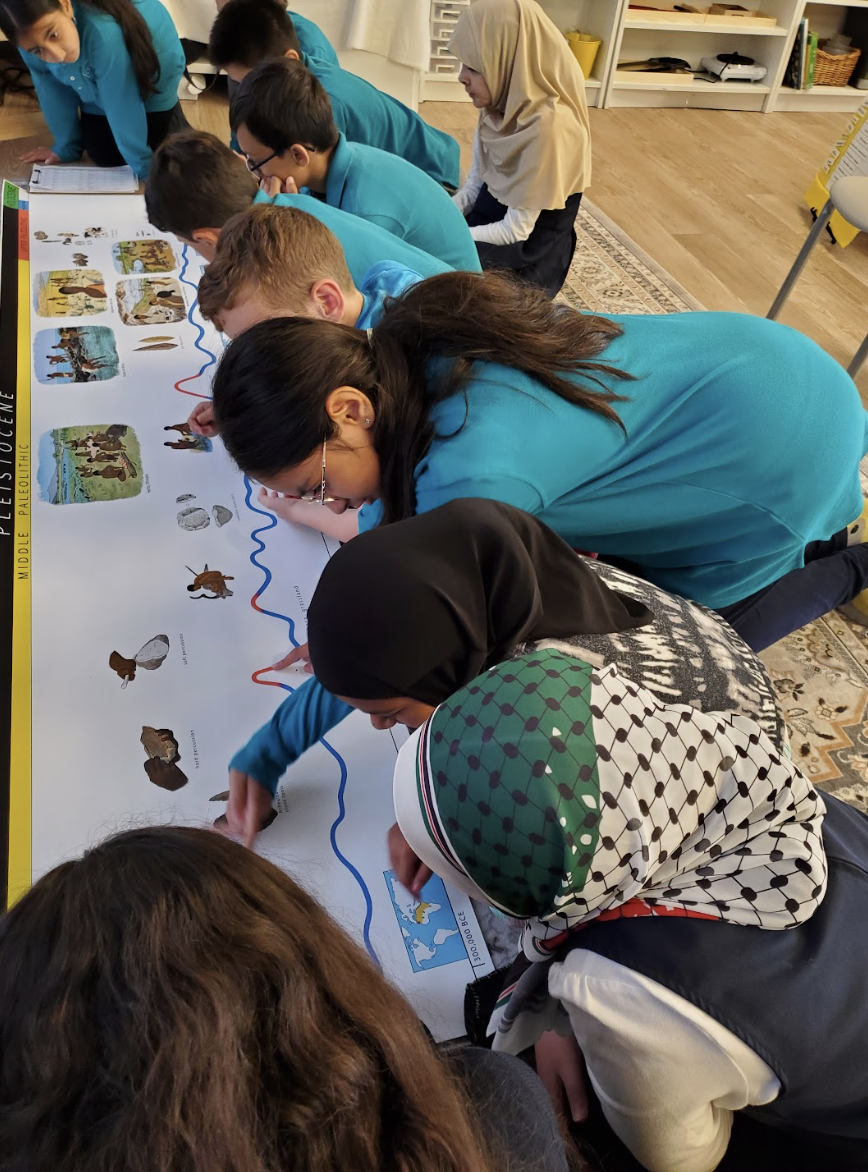
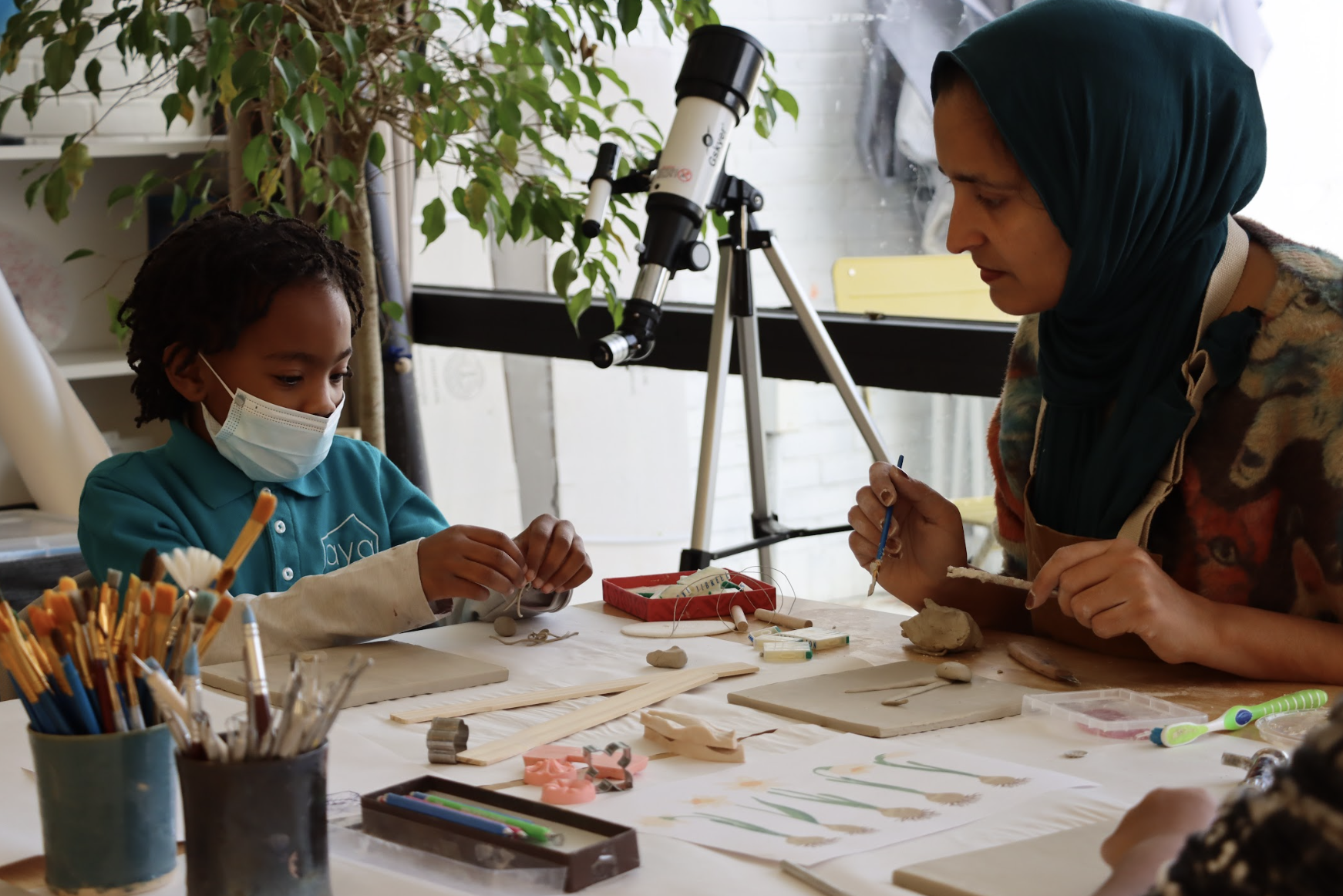
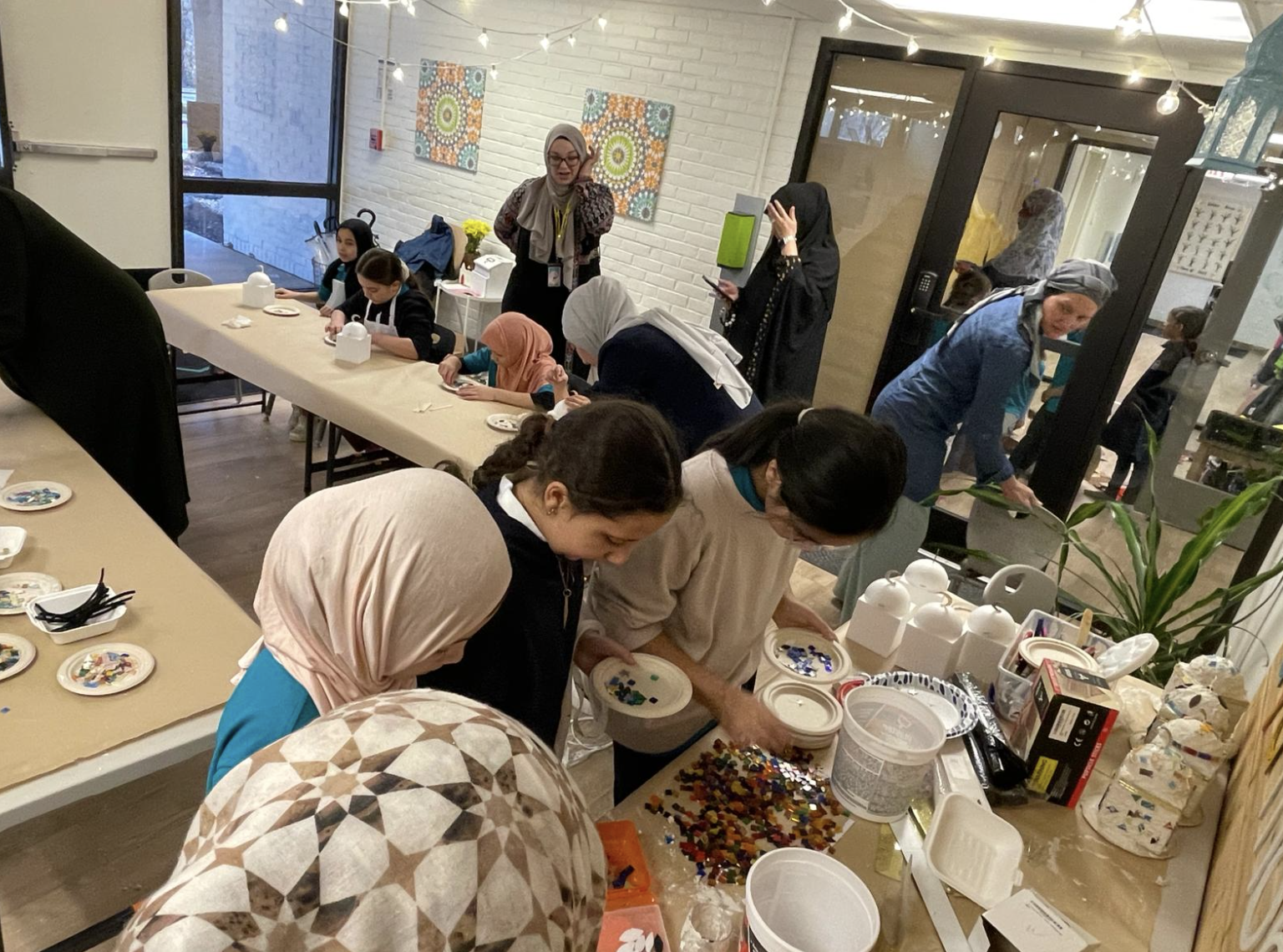
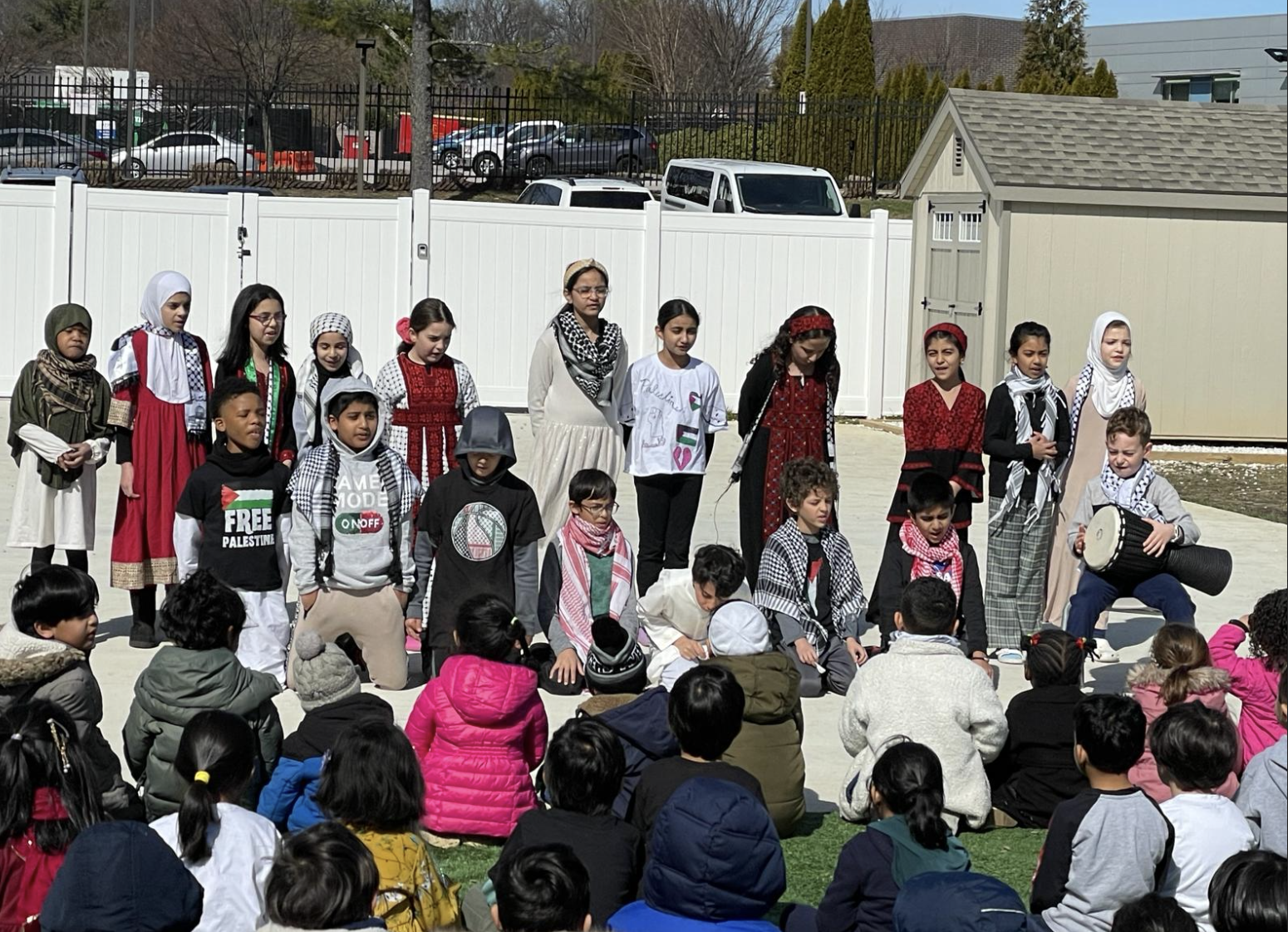
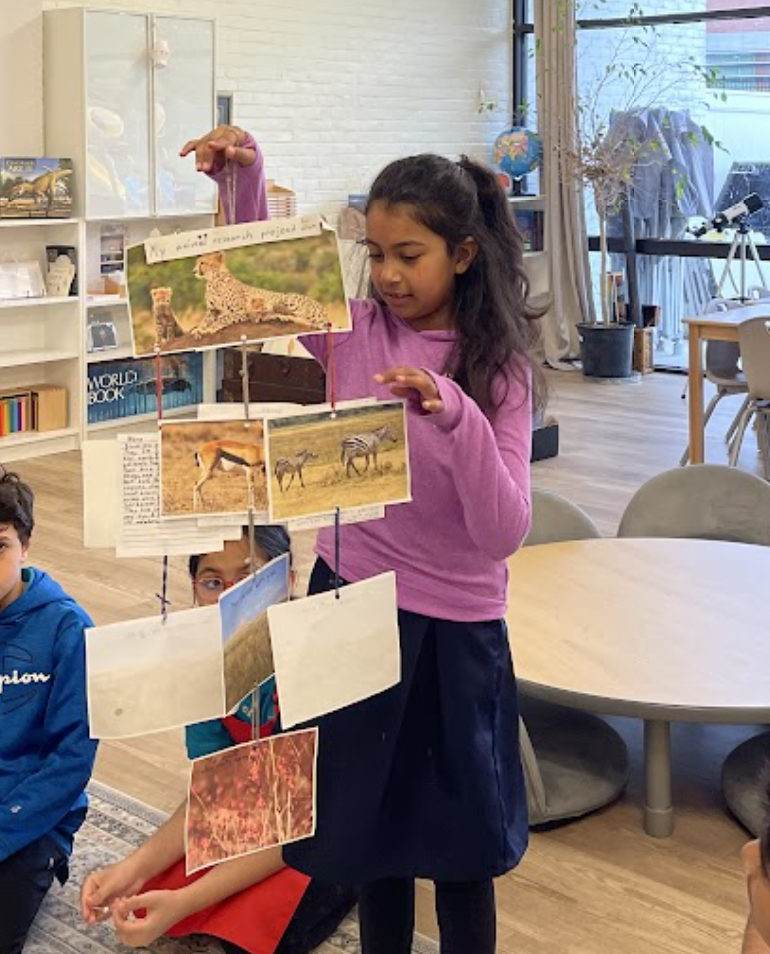
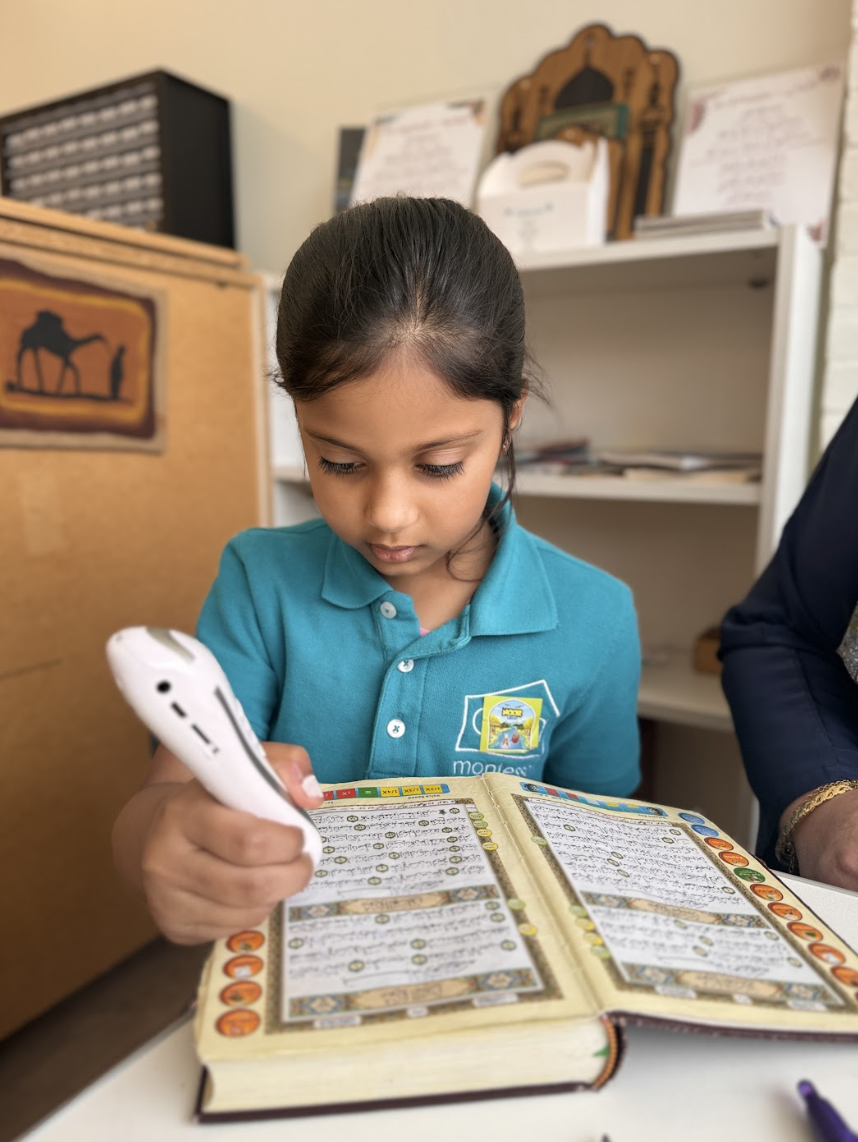
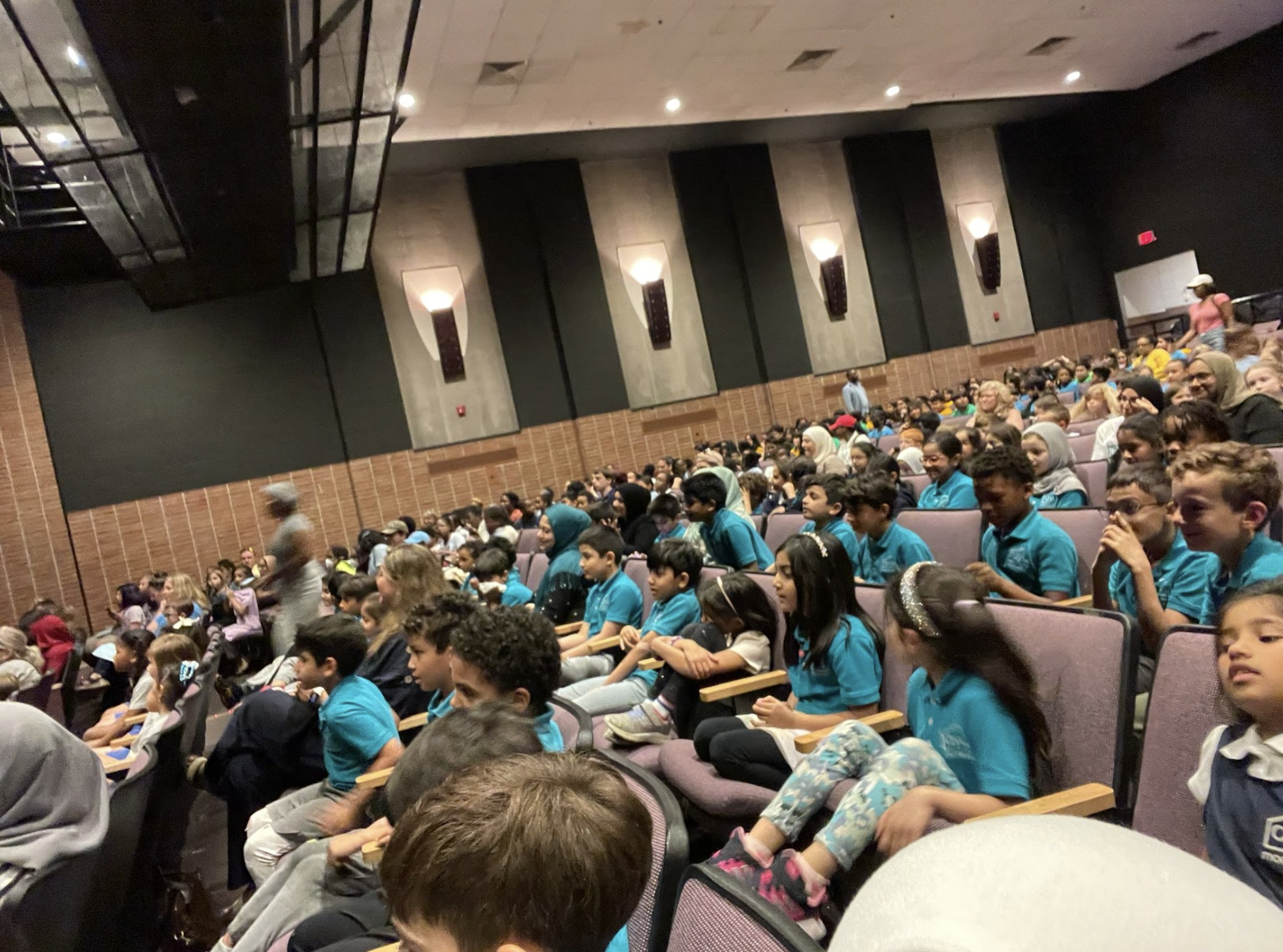

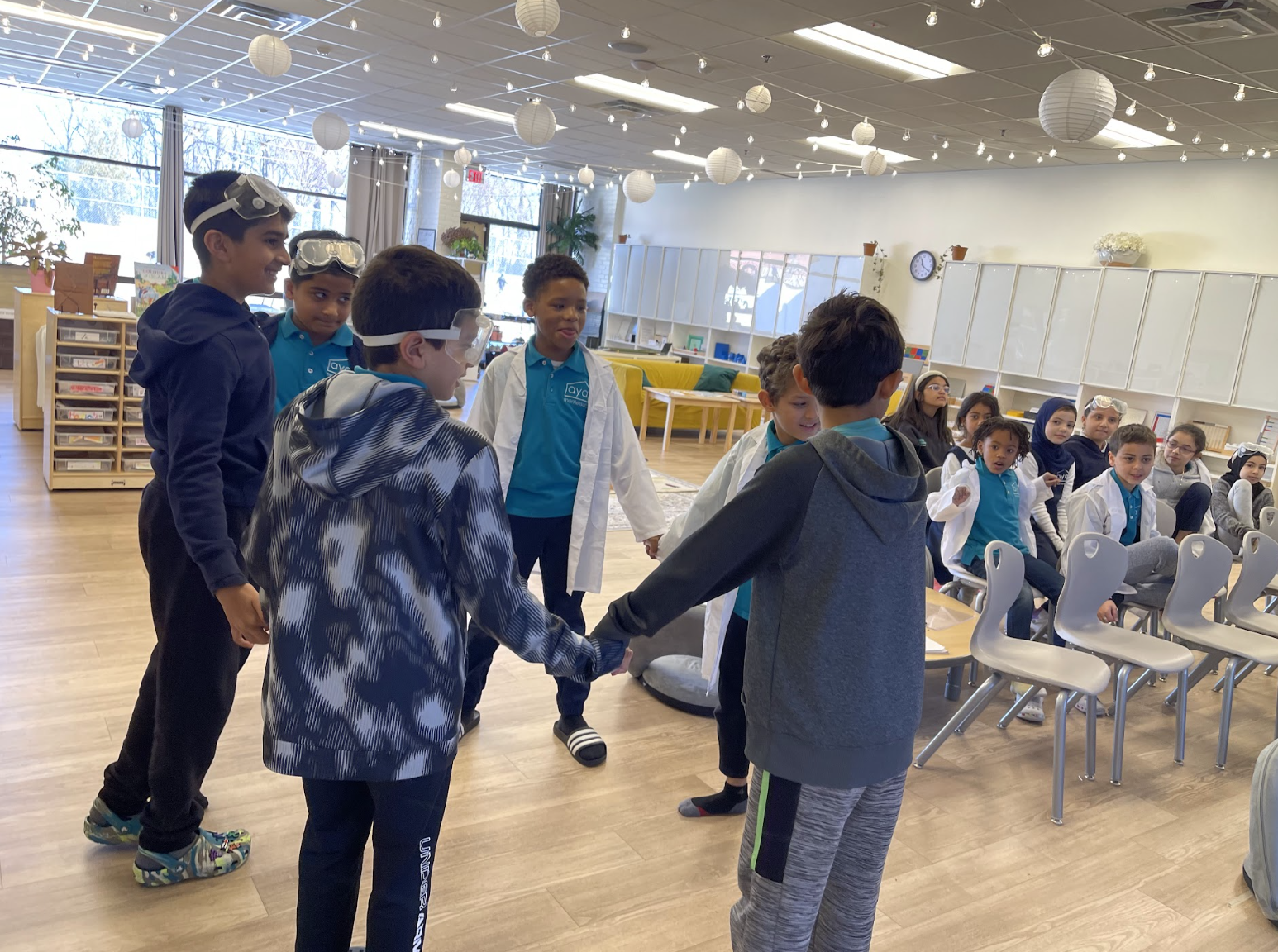
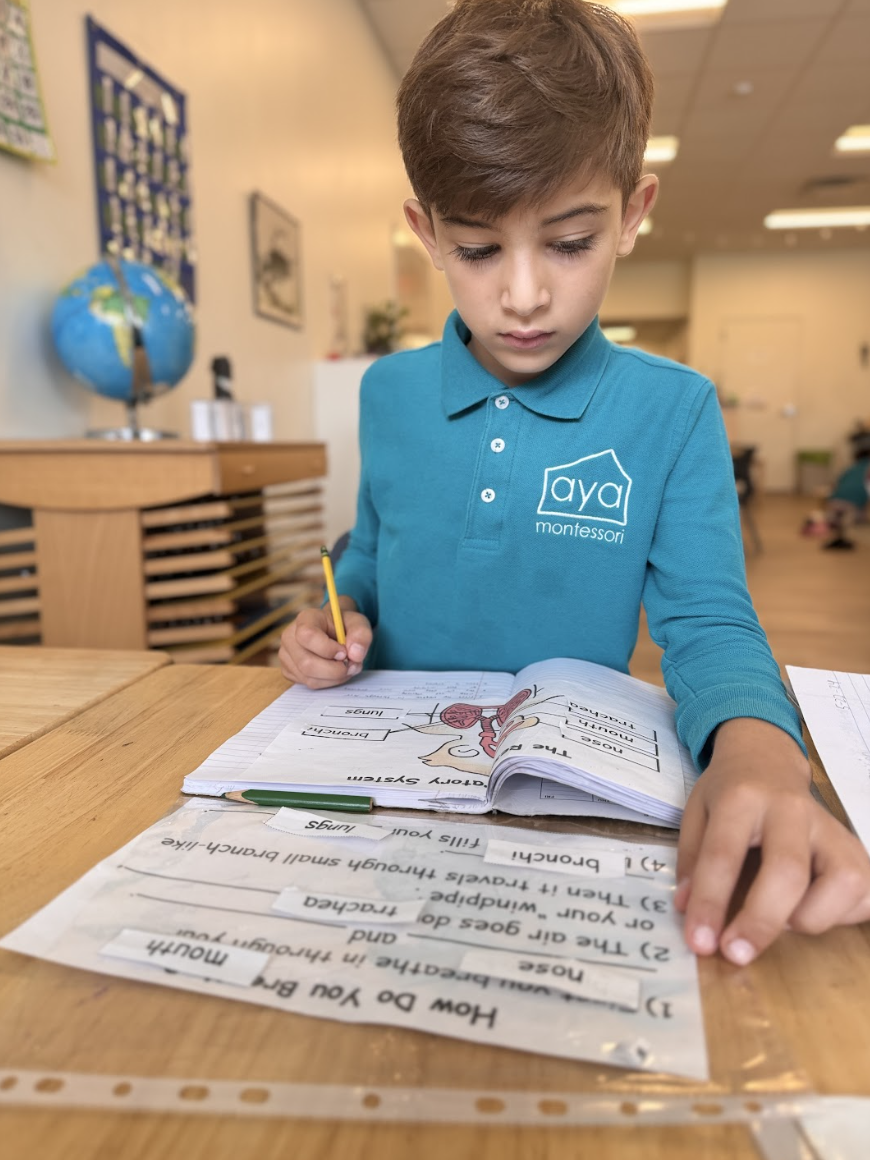

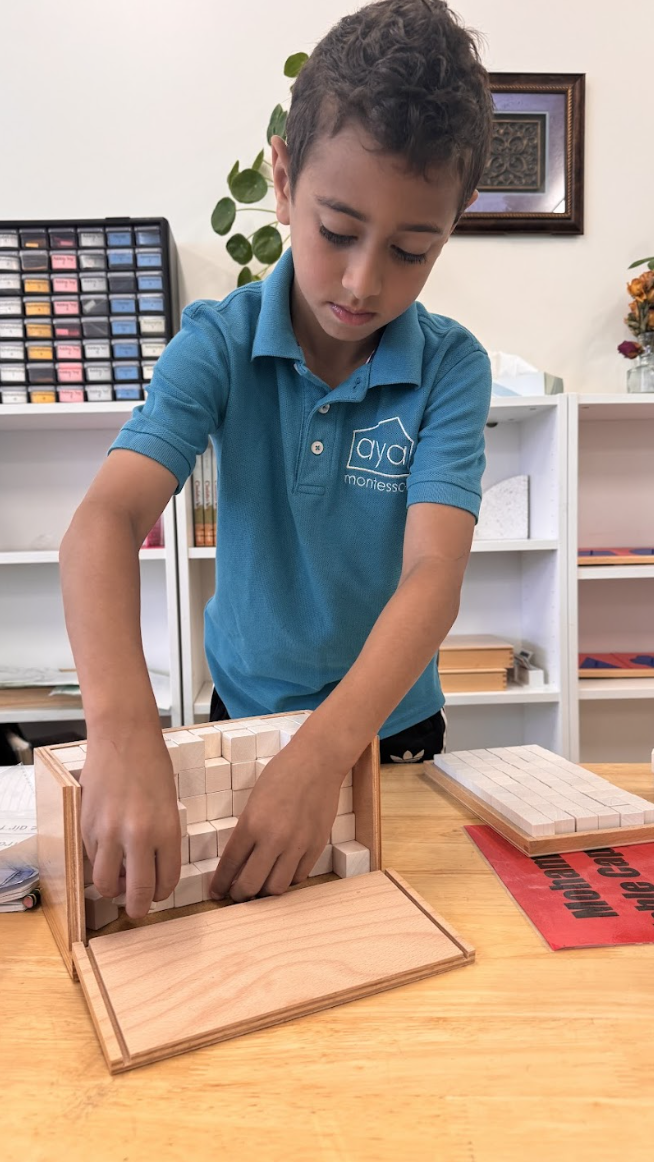
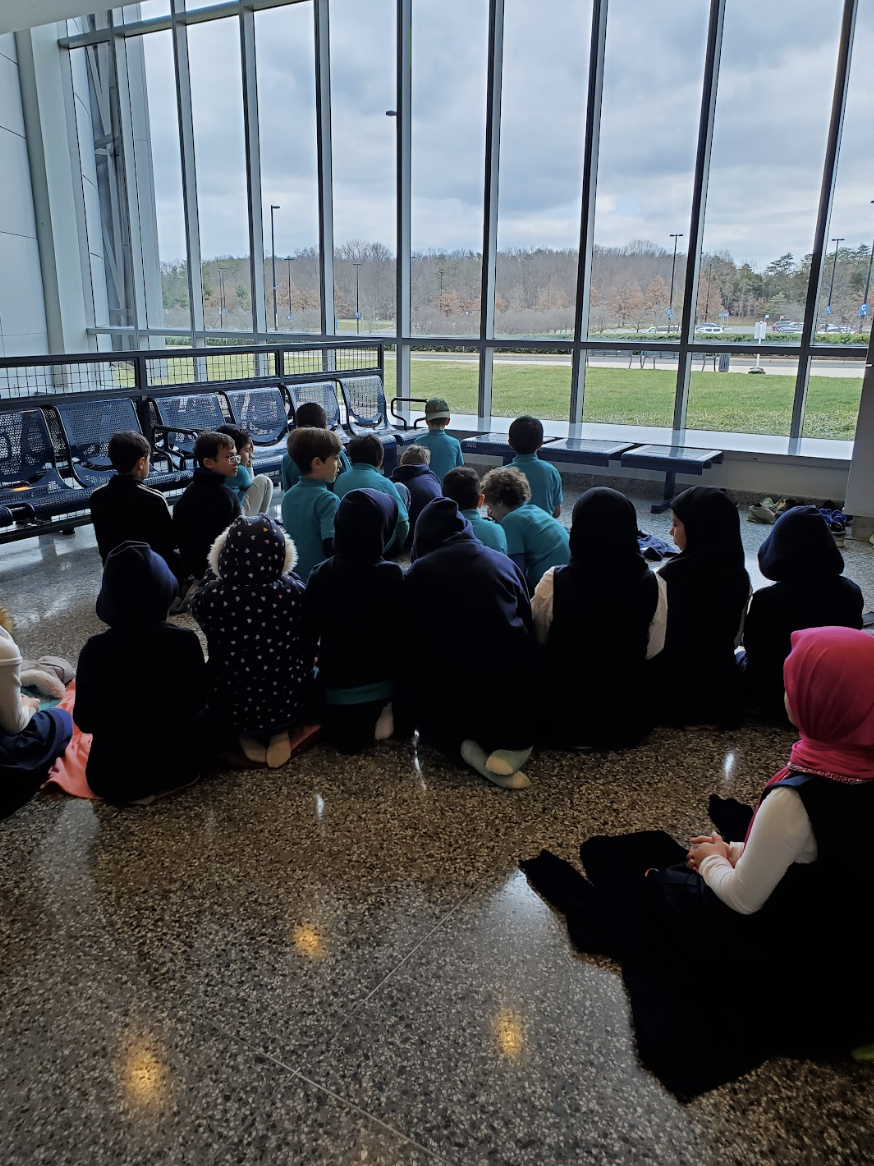

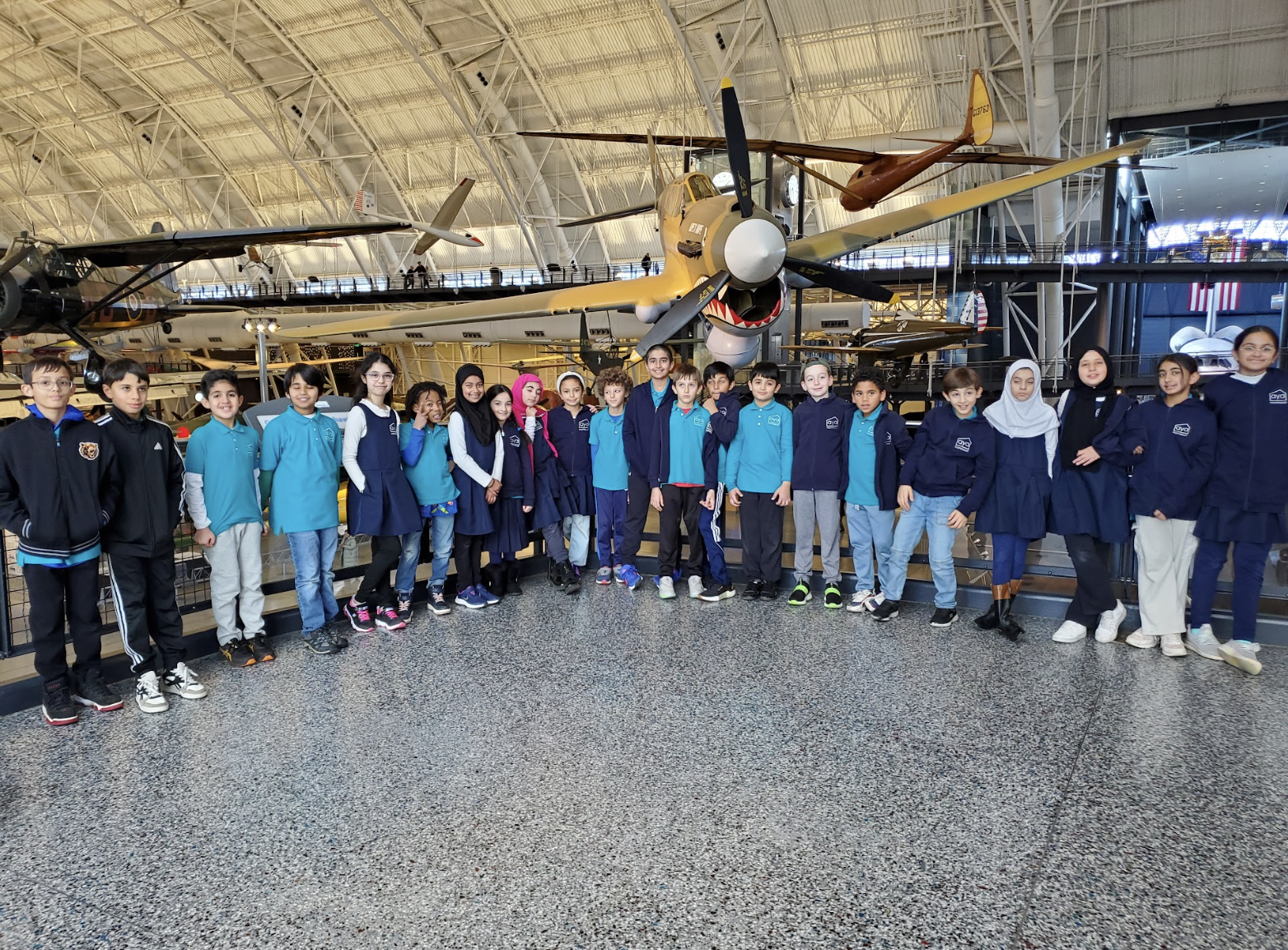
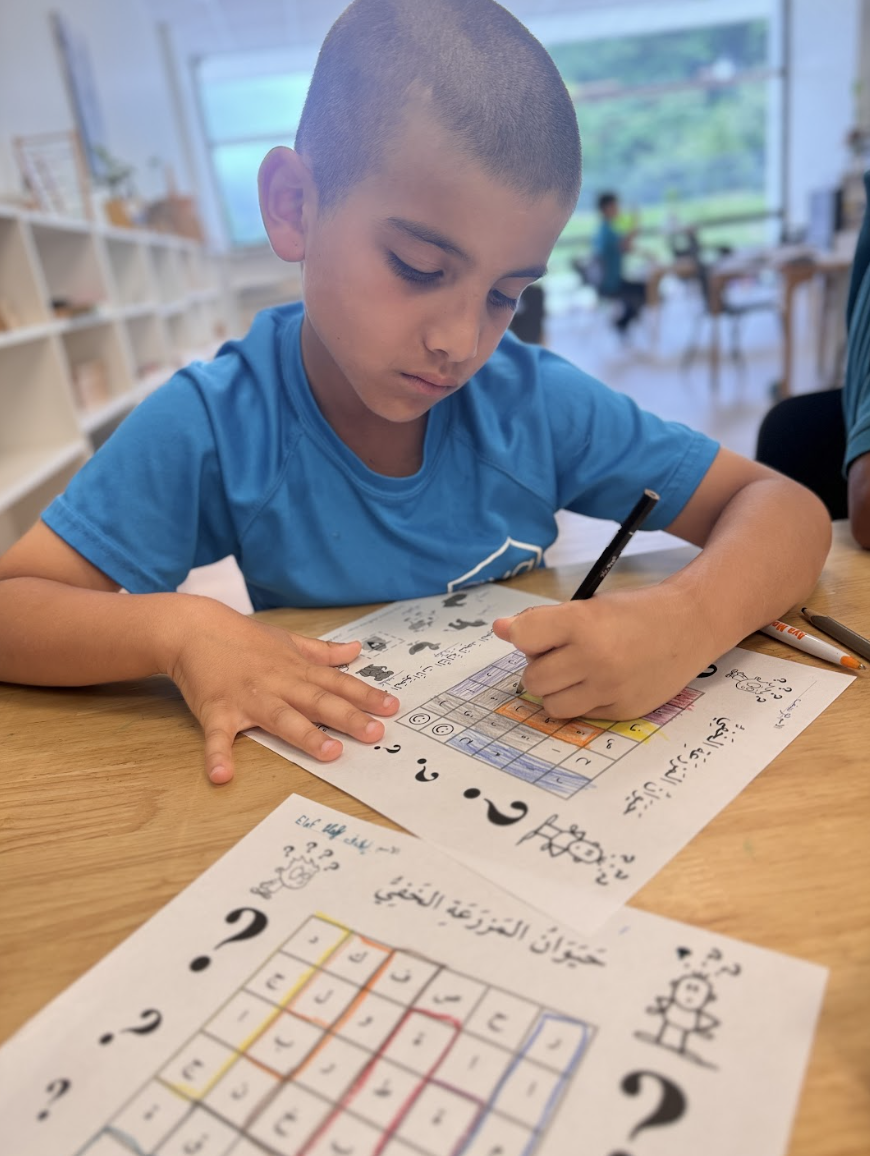
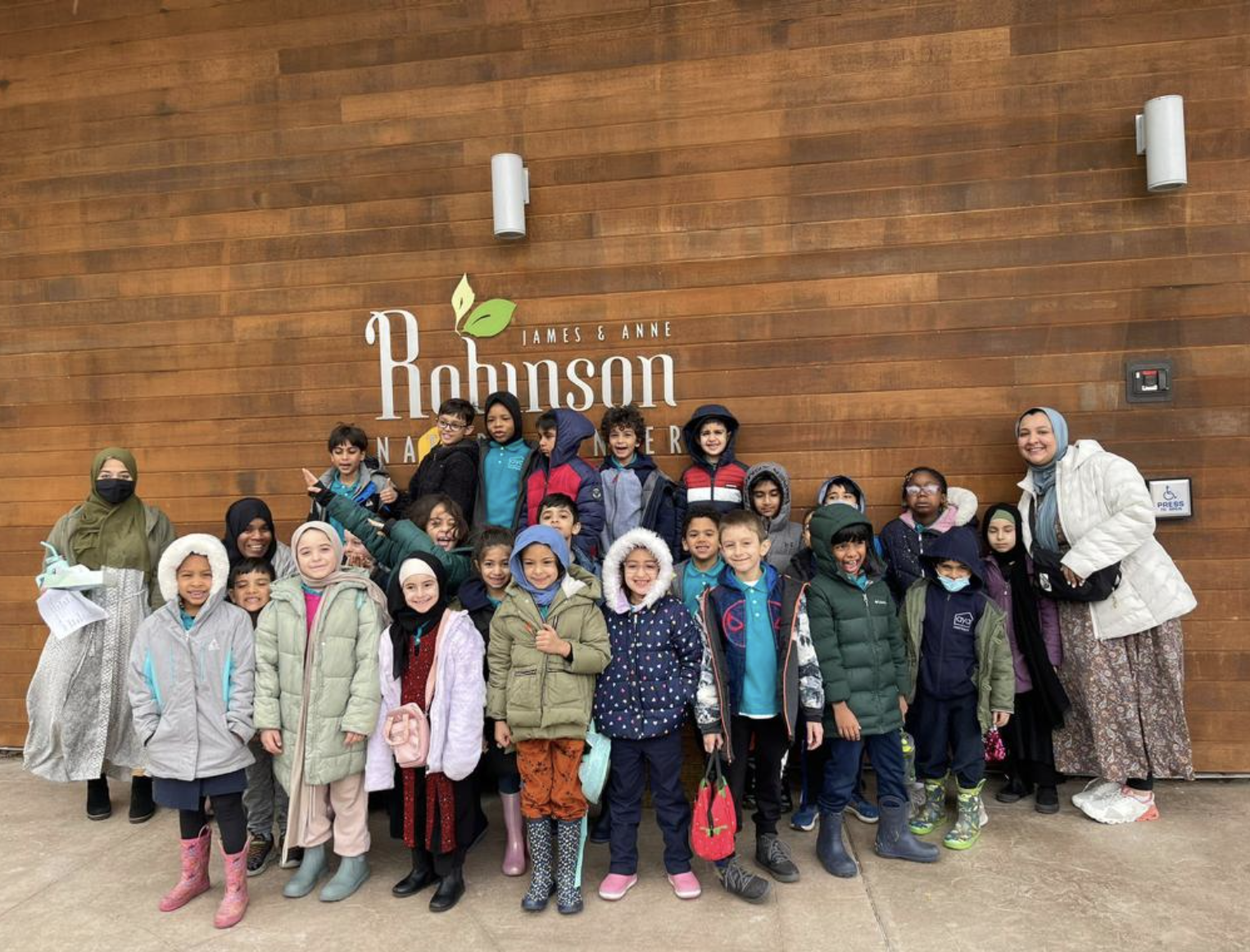
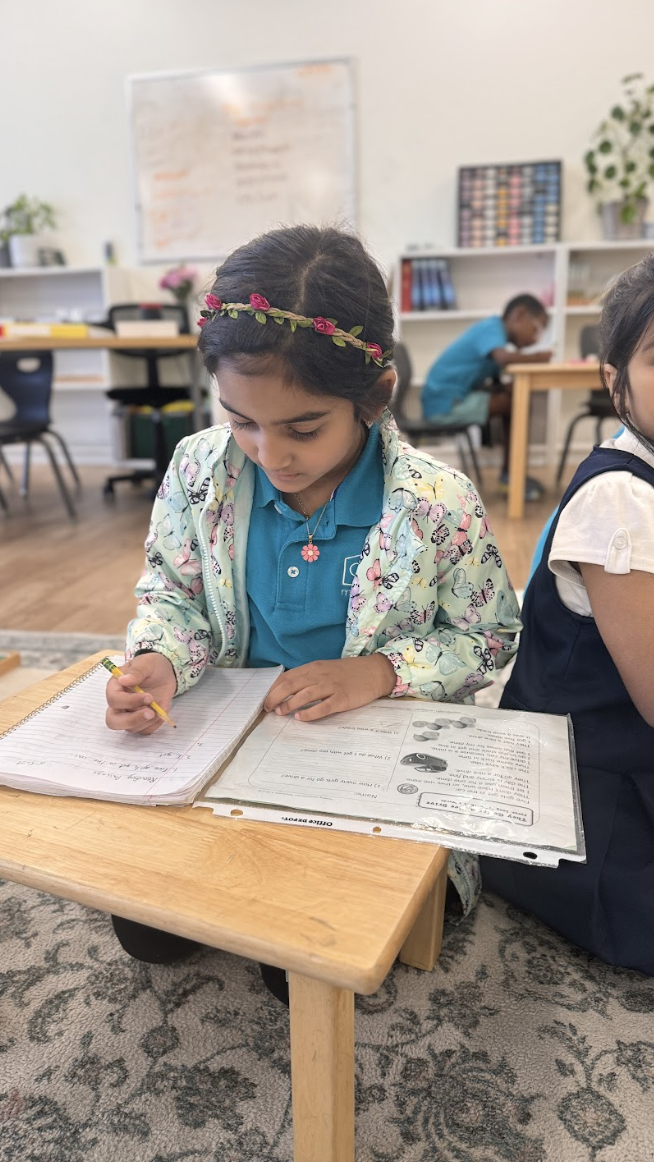
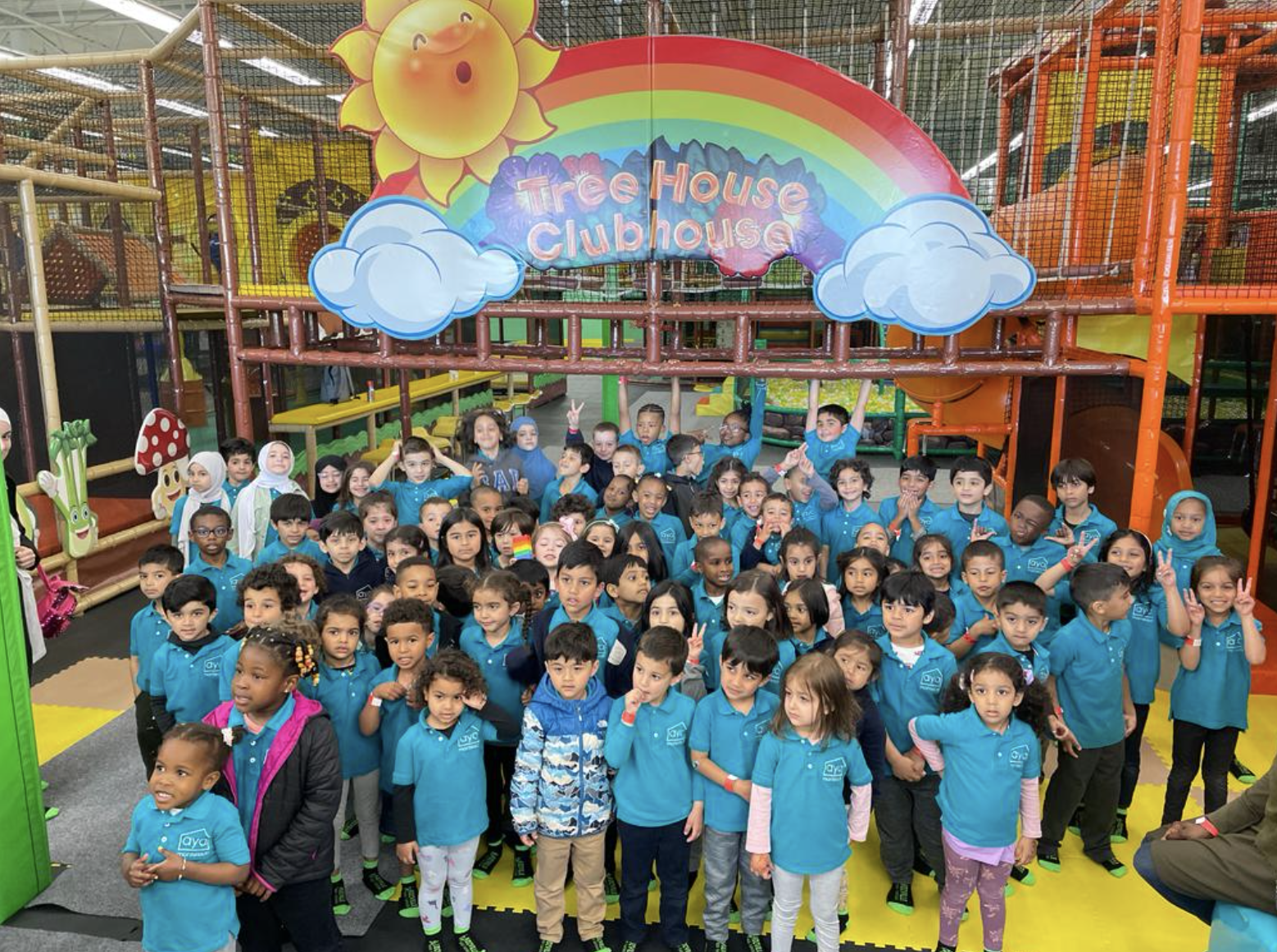
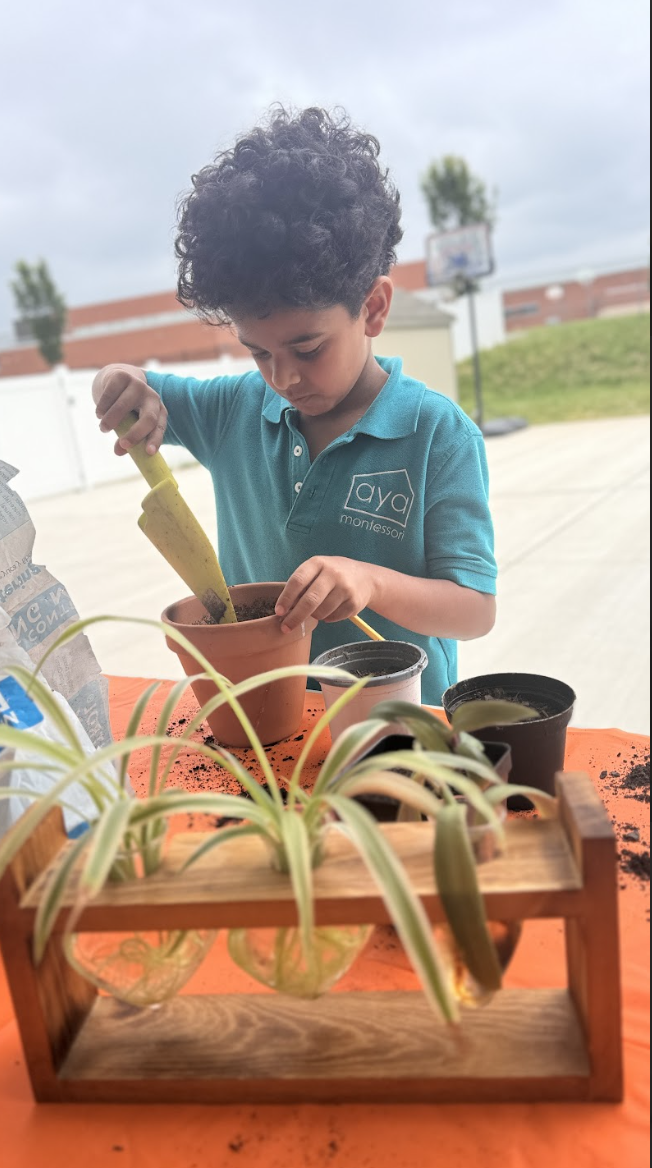
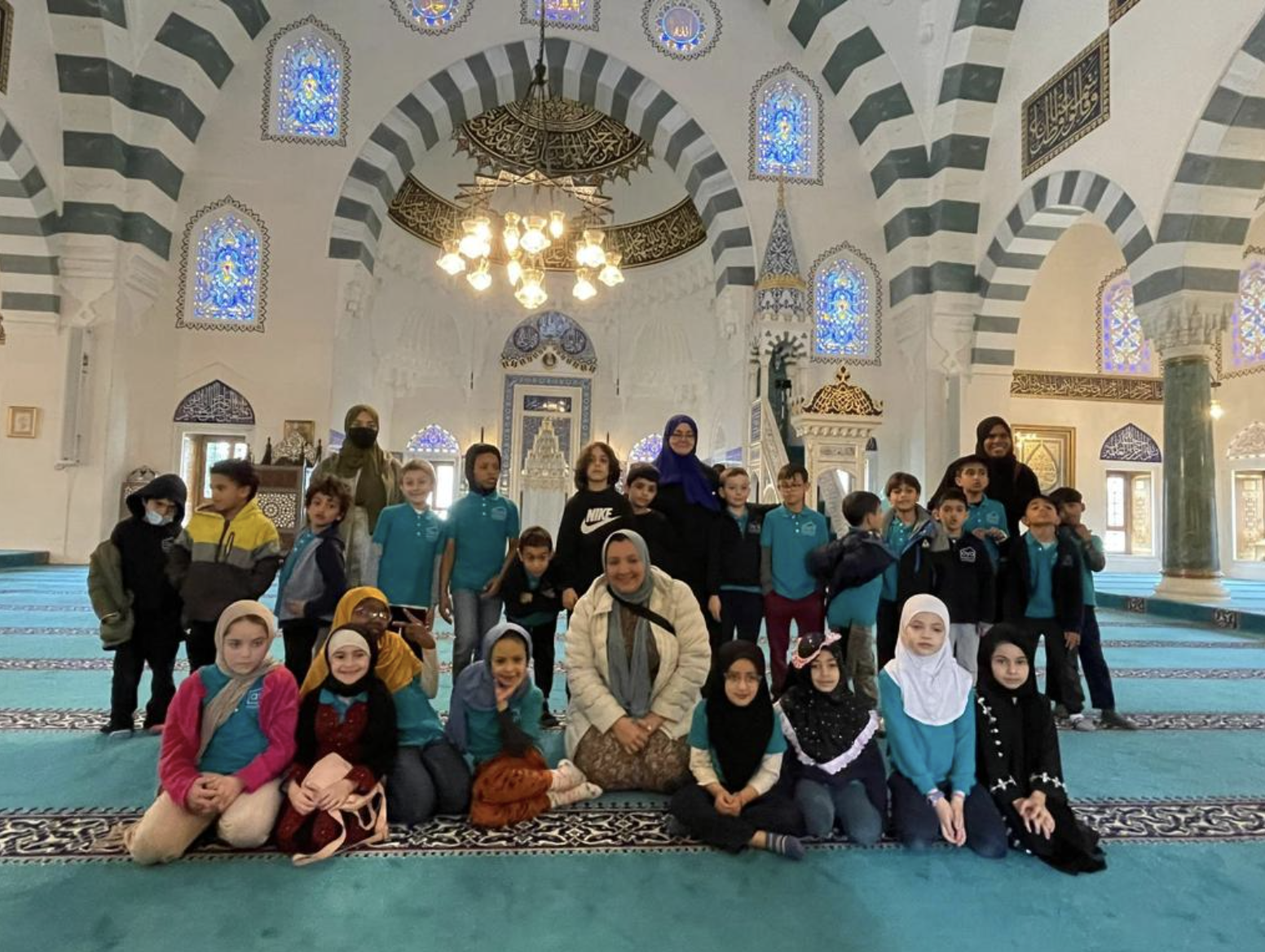
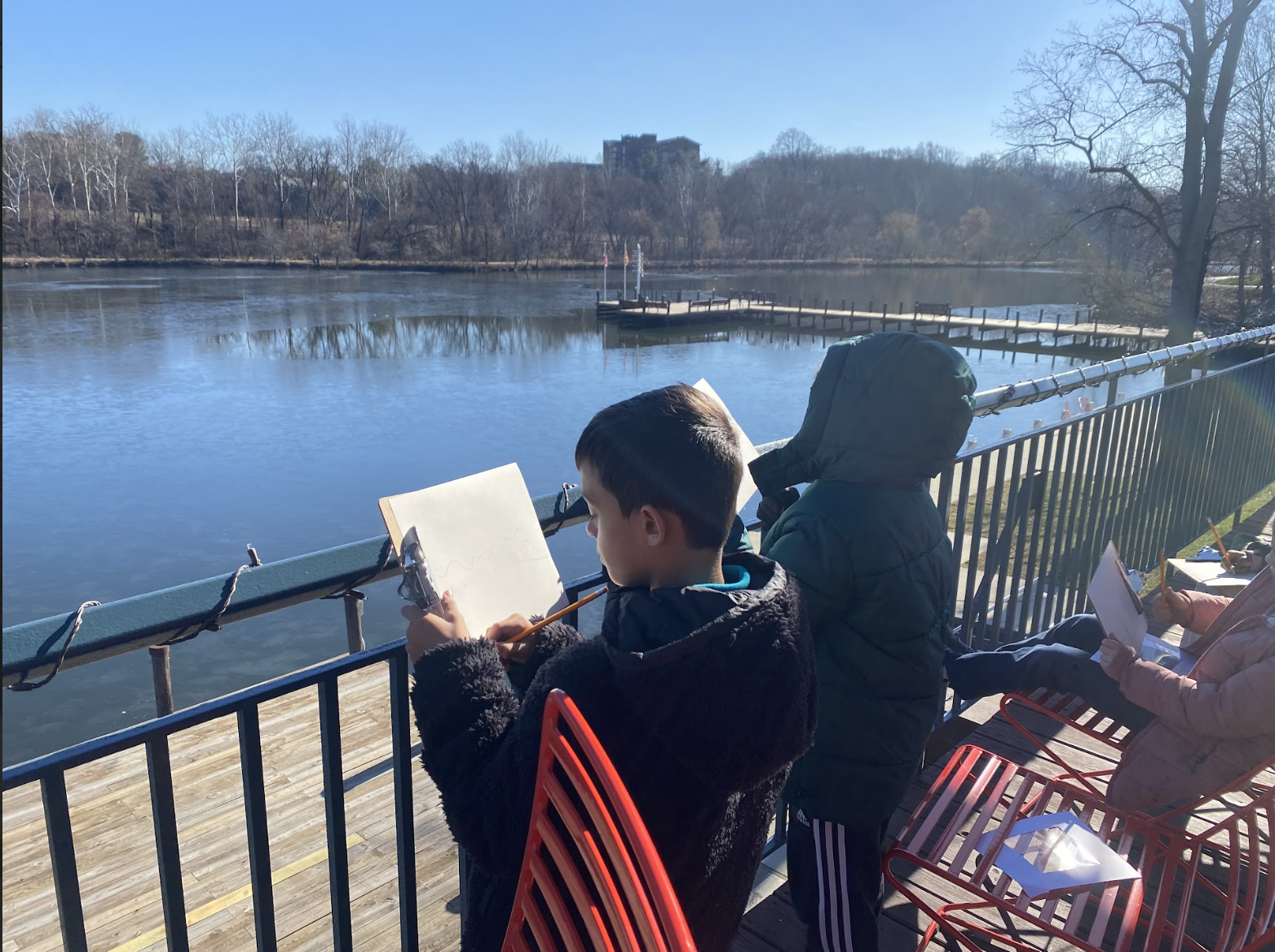

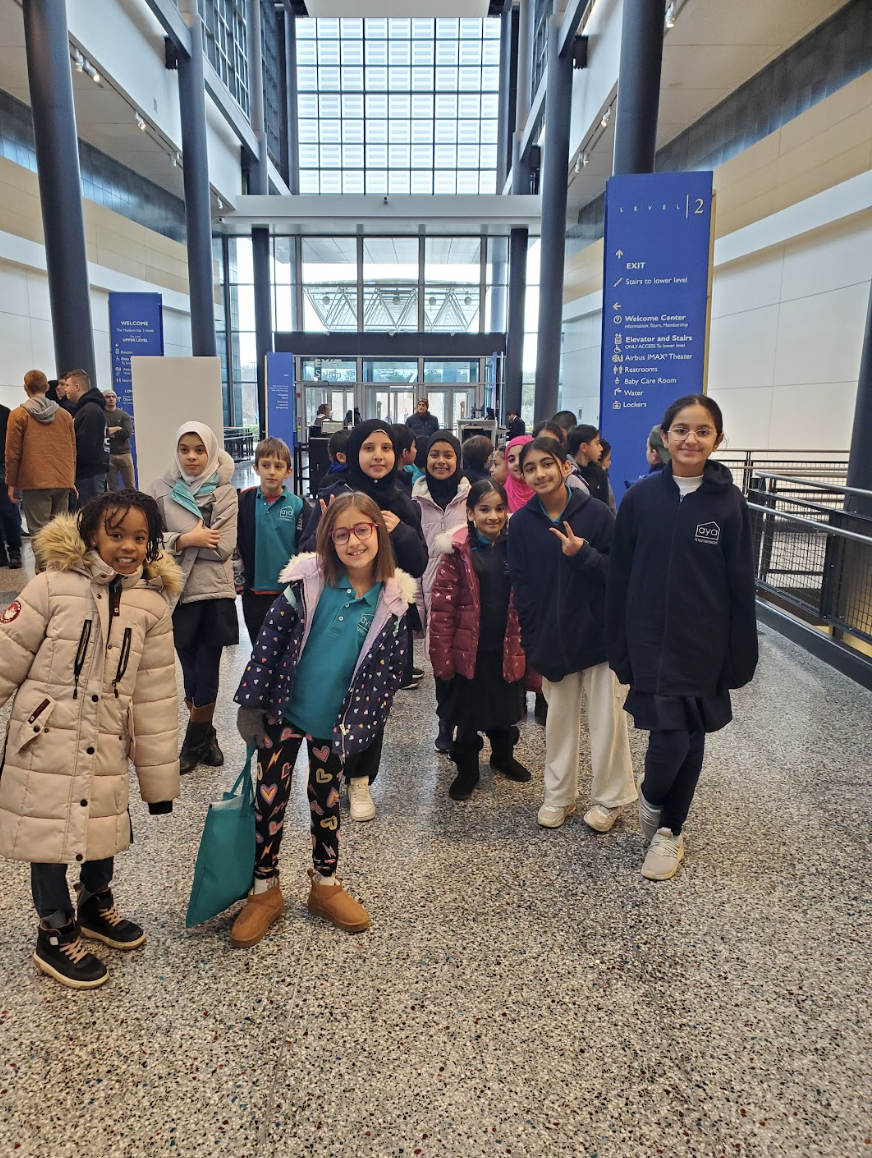
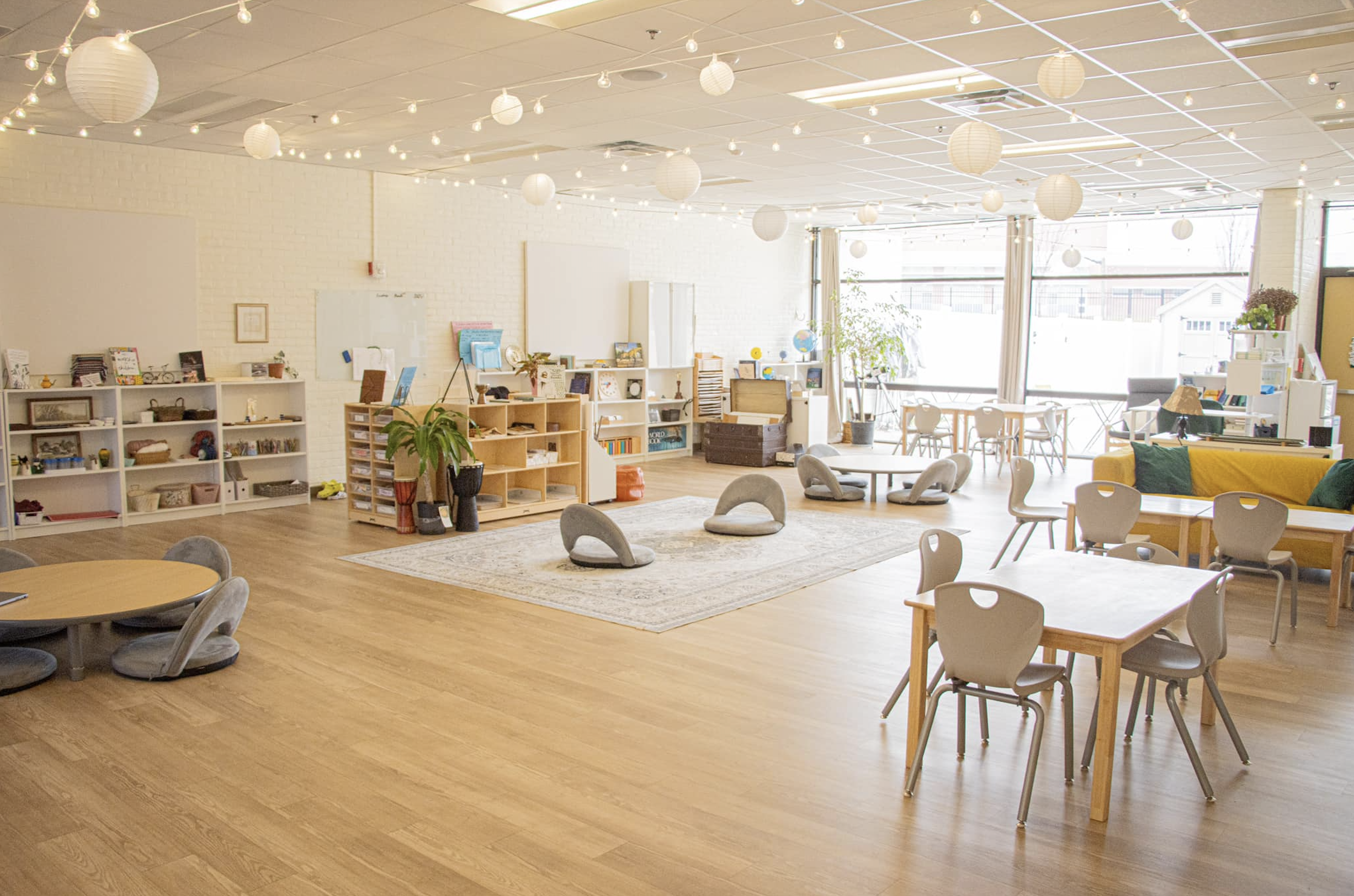
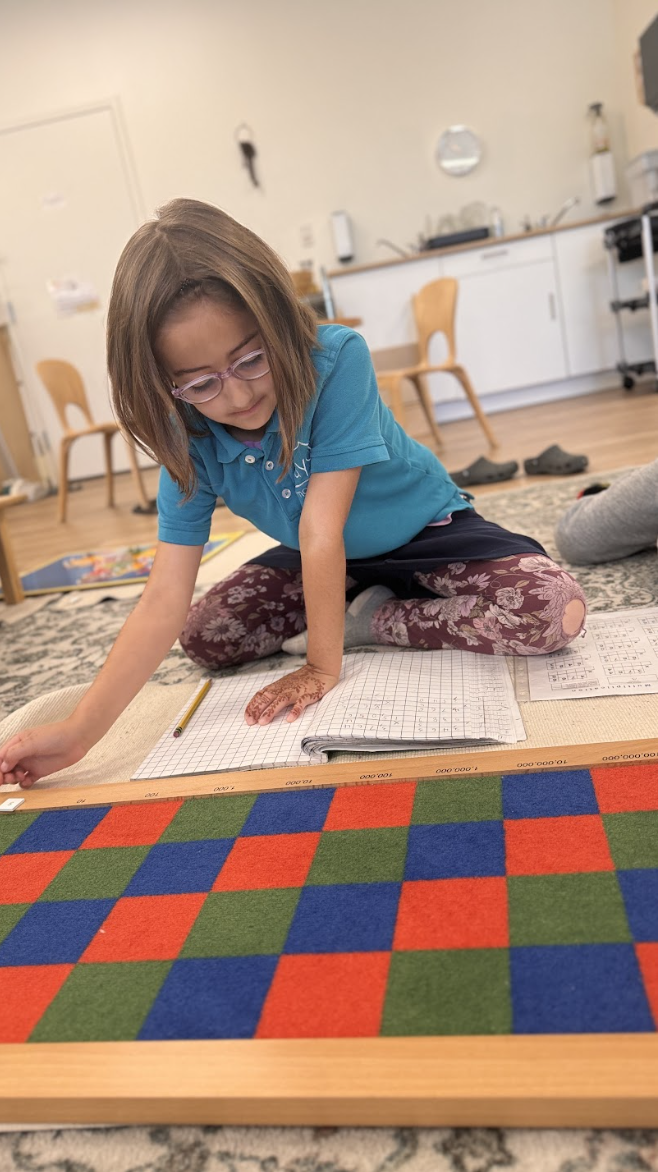
Interested in touring Aya?
Attend one of our upcoming guided school tours and join our admin on a thorough overview of our program and a campus walkthrough. This step is required for enrollment.
We offer school tours once a month between December and March.

